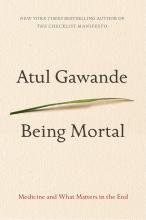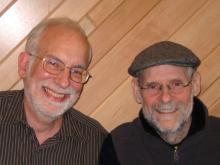dying

EARLY IN Being Mortal, surgeon Atul Gawande tells the story of Joseph Lazaroff, a patient with incurable prostate cancer. His medical team pursued multiple treatments, including emergency radiation and surgery, but Lazaroff ultimately died. What most struck Gawande later was that he and the team avoided talking honestly about Lazaroff’s choices—even when they knew he couldn’t be cured.
“We could never bring ourselves to discuss the larger truth about his condition or the ultimate limits of our capabilities, let alone what might matter most to him as he neared the end of his life,” Gawande writes. “The chances that he could return to anything like the life he had even a few weeks earlier were zero. But admitting this and helping him cope with it seemed beyond us.”
Why is that? For one, Gawande’s medical training didn’t prepare him for dealing with frailty, aging, or dying, he writes. He and his peers were taught to “fix,” to heal people with expertise, tools, and tests. Like most doctors, he approached his patients’ challenges as medical problems to solve, whether they were the accumulations of old age or terminal illness.

Brittany Maynard chose to die Nov. 1, but on what would have been her 30th birthday Nov. 19, her voice in support of the Right to Die movement rang loud.
Maynard, who had an aggressive brain tumor, was the face of Compassion & Choices, the advocacy group campaigning to legalize physician-assisted dying in all 50 states. She still is.
On her birthday, the group released a “call to action” video with passages and narration drawn from prerecorded videos with Maynard (pronounced MayNARD) and other advocates explaining why the right to die by legal prescription is important to them. It is now legal in Oregon, Washington, Montana, Vermont, and New Mexico.
In the video, Maynard concludes: “If there’s one message to come away from everything that I’ve been through, it is no matter what life kind of presents you with, is never be afraid to use your own voice. And even if you are uncertain, even if your voice is shaking, ask the questions you want to ask, speak up for yourself. Advocate.”
I WAS PRESENT when my uncle died. I didn’t plan to be, but once I understood his end was near it felt right. I had been the flower girl at my aunt and uncle’s wedding, the ritualized beginning of their life together, so witnessing this milestone event of my uncle’s death seemed appropriate. And I wanted to support my aunt, I told myself.
My aunt is my father’s youngest sister. They are the last living siblings from nine brothers and sisters; both their parents are also long gone. My aunt wears this fact like a veil. Sometimes it’s barely noticeable; sometimes it’s the only thing she sees. While my parents’ divorce had kept me apart from my aunt for much of my life, it seemed important, the fury of those old family dramas now covered with dust, to offer my aunt support in her husband’s last days, hours, then moments. She was hardly alone. My aunt has three grown daughters, and my uncle comes from a huge family, most of whom were packed into the hospital room where he died at 2:20 p.m. on Sept. 22, 2013.
My aunt told me she was happy to have me, a representative from her side of her family, present. So I was there. For her, I said.
But to tell the truth, I was there to learn. I have plenty of information about the beginning of life. People in my generation received hours of tutoring, lecturing, indoctrinating, and warning about puberty, childbirth, birth control, and “safe sex.” Although we were actually not given much information about sexuality—I had to learn that on my own. But I knew even less about death.

Religion has, for centuries, been fairly obsessed with the afterlife. For some, what awaits us after our physical death is fairly central to their faith. But thanks to the Internet, many of us end up having a sort of life after death, whether we intended to or not.
In a recent article published in the New Yorker magazine, Pia Farrenkopf experienced the sort of digital life after death that some might find appealing, while others would consider it rather horrifying. Pia traveled frequently for work, so it was not unusual for her neighbors not to see her for long stretches at a time. They would mow her lawn when the grass got long and kept an eye on the place during her long stints out of town.
As such, she lacked many close ties near home, and like many of us, all of her monthly finances were automated and tied directly to her bank account. So although she died in early 2009 while sitting in her car in the garage, it was not until very recently that anyone actually discovered she was dead.
It took that long for her checking account reserves to run out, which led to utility shut offs and a visit from the bank to issue an eviction notice due to missed payments. So although her body had set partially mummified in the garage for nearly five years, as far as the outside world was concerned, she was still alive.
In his book, The Singularity is Near, Ray Kurzweil speaks of a not-so-far-off point in our future when the ability of computers to process information and replicate human thought and behavior will get to the point that we will question what it means to be conscious, and to be a person.
It seems like the stuff of science fiction, to consider the possibility of people uploading the entirety of their life experience, or even some iteration of what we understand to be their consciousness, to a network of computers. But the fact is that we already are wrestling with these sorts of ethical implications, even today.

My friend Mike died last week.
We were the same age. We grew up together in Marinette in northeast Wisconsin. Worked our way through Boy Scouts together. Played at each other’s houses. Studied in the same classrooms. And then, over time, we drifted apart. Until this past year. That’s when I learned that Mike was dying of cancer.
In less than 12 months, we re-established a friendship and Mike and his wife, Nancy, taught me amazing lessons about living with the prospect of dying.
In our initial contacts, Nancy wrote of Mike:
“He is doing well with his treatments. I am amazed, each day, how well he handles this journey we are on. Never once have we asked ‘why us?’ We feel so blessed that we have each day to love each other and enjoy our retirement one day at a time. Not everyone is so lucky to have a long goodbye with the one they love.“
There's something special about the bookends of our lifetimes. I became a first-time father seven months ago and a hospice chaplain just one month past. Growing up and growing old, especially the first and last months of our lives, can be surprisingly similar experiences.
I fed my daughter sweet potatoes for the first time last night. Introducing her to solid foods has been a treat. While we're trying our best to teach her the sign language words for "food", "more", and " all done", Robin still finds closed-mouth grumble-whines to be the best way to let us know she thinks sweet potatoes aren't all that hot. Another subtly nuanced whine might instead wonder, "You don't happen to have any more mashed banana or applesauce around, would you?" My attempt to turn the filled spoon into an acrobatic and roaring airplane met with scant success.
Now he was teaching in one of the synagogues on the sabbath. And just then, there appeared a woman with a spirit that had crippled her for eighteen years.
I've been reading Paul Harding's debut novel, Tinkers, which was this year's surprise Pulitzer Prize winner. It's a modest tome -- slim of build, light in the hand.